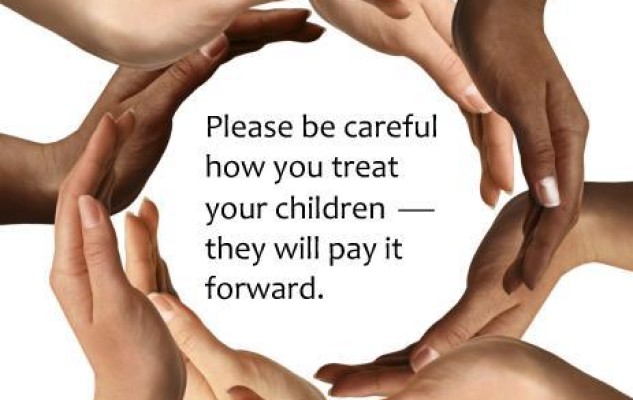
Now that my own son is in school, I’m reminded of the decade I spent as a teacher, watching nervous 14 year-olds file into my classroom. My goal was to teach senior grades, but there weren’t any positions available, so I was stuck teaching many courses for ninth grade science, health — and sex ed to a room full of red-faced teenagers who couldn’t say “penis” without complete hysterics.
Even so, I grew to enjoy these emotional, hormonal, confused, impulsive creatures. It was a pleasure to witness their honesty and openness. I remember the look of pure excitement on the face of a ninth grader who’d been struggling with something, and finally got it. Most students this age still have some of the little-kid enthusiasm that seems to get lost the further they move into the teenaged years.
Parents comment that their 14-year-old children start drifting and really struggling at this age. The compounding effects of physical awkwardness, their desire for independence, and the mean behavior of other students can be overwhelming. Here are five ideas that might help you stay connected with your 14-year-old and support him better through this wild time.
1. Have regular “What are you okay with?” chats. Take your 14-year-old aside and offer that you still want to spend time with and hug him, but you understand that can be embarrassing to him. On the flipside, ask your child to let you know what he’s okay with: Can you hug him in front of his friends? Drop him off right in front of his school?
2. Make “attachment time” before school and when you get home. It’s easy to hit the ground running in the morning and be on your kid’s back about getting up or getting out the door on time, but that can set the stage for negativity. I find that waking up a bit earlier and getting ready before the kids are up helps me sidestep that rush mode. Getting organized the night before with backpacks, signed letters, homework and lunch ideas means you don’t have to harp on those tasks first thing in the morning. Instead, you can focus on positive interactions with your child.
Similarly, when you see each other later in the day, make time to reconnect before jumping into food prep and activity or homework time. When everyone is relaxed, encourage your child to tell his story. What’s happening at school or with his friends? What’s his favorite music right now? Use paraphrasing and empathetic listening to get your child to open up. Try something like, “So I see you’re spending more time with Jeff these days.”
Remember that teens open up better when they aren’t face-to-face with someone. Conversations over dinner-prep, clean-up, walking and driving have been shown to be more effective than talks that happen when you’re sitting across and looking at you’re teen. But that’s provided you try very hard not to judge or correct what your teen says in these moments of sharing. No freaking out allowed!
3. Watch your “nice-to-nag” ratio. The early teen years are a time in which to really pick your battles. Too much nagging will cause your teen to tune you out, so monitor yourself! What percentage of the time are you giving your teen instructions or correction versus positive attention and listening? I can usually tell when my nag percentage is too high as my sons start unraveling. To keep myself in check, I try to do what, in business, is called a sh** sandwich. For any negative comment I need to deliver, I start off and end off with something positive. Connect more, correct less. More bun, less filling.
4. Don’t panic! This is the most common age to begin using drugs, drinking alcohol, and getting into sexual activity. The more secretive teens are about these things, the more risk-taking they will likely try. Remember to engage them in enough chats about these topics to let them know you care and that these aren’t taboo areas of conversation – but not so much to scare them off. Risk-taking is normal for teenagers so your job isn’t to stop them, but to help develop their ability to manage a tricky situation. Remember not to judge or correct what they say.
A good approach to engaging teens in these topics is to ask their opinion. “So, it’s pretty normal for kids to get into drinking at this age. Do you think parents should let their kids drink at home?” If your child happens to answer “Sure! That sounds great!” don’t snap! Stay calm and paraphrase back with suggestions to grow his rational mind. Say something like, “So you think it’s okay for kids to drink at home. What should the parent do if a kid hurts himself? Who’s responsible in that case?”
Also, provide health information, and again, ask your teen’s opinion. A great place to start is with this widely published study that found smoking pot is harmful to a teenager’s brain. Show your teen the article and ask about his thoughts on the article or topic in general. Your openness to talking about drugs in a general sense may help you learn more about his specific experiences and can help strengthen your relationship.
Can you see the theme? Provide information and create invitations to openness without taking away your teen’s power to make choices. The goal is to get them to think critically without feeling like you’re telling them what to do.
5. Find lots of different ways to show how your teen matters. The crying “rebellious” teens and parents who’ve been in my office for one-on-one counseling often have the same goal: Each wishes they mattered more to the other. What they don’t realize is that they do matter to each other, but the other person just doesn’t know how to communicate it. Don’t assume your child knows how much you care. Be conscious of ways to express this. And yes, your teen still wants you to hug him.
On the days when you notice your teen’s slumped shoulders, mumbling, or sad eyes, remind him of how much he matters. It will show you support him and help get to the heart of what’s causing his grief.
Dr. Marilyn Price-Mitchell, a developmental psychologist said, “Parents should remember that one of the developmental aspects of these early adolescent years is for teens to develop their own identities, separate from their parents. So at the same time you are making every effort to stay connected, you also want to show acceptance and respect for the young adult they are becoming.”
What if your attempts are met with seeming hostility? When a teen says something like, “I hate you,” you’re being given valuable information. Things aren’t okay in his world! Find a way to hear what your child has to say. All teens have a story and just want someone who will listen. Let that person be you.
Note: For more information about paraphrasing, empathetic listening and generally great suggestions about connecting with teens, I recommend exploring Stephen de Groot’s Getting to Better network.
What are some other ways you’ve found to help you stay connected to your teen?
This Week's Articles Read, learn, live
-
 Summertime grilled vegetables
Summertime grilled vegetables
-
 5 Ways to make this summer full of unforgettable family fun
5 Ways to make this summer full of unforgettable family fun
-
 10 Reasons to take a family vacation in Puerto Vallarta
10 Reasons to take a family vacation in Puerto Vallarta
-
 5 Fun tips for spring cleaning with kids
5 Fun tips for spring cleaning with kids
-
 10 chick flicks with New Year’s Eve scenes
10 chick flicks with New Year’s Eve scenes
-
 The day after Christmas: 5 ways to handle the biggest downer of the year
The day after Christmas: 5 ways to handle the biggest downer of the year
{ 4 comments }
Andrea,
Thanks for helping us to resist ‘internalizing’ the “I hate you” comment, and to understand…it’s about focusing on what’s going on in their world. Nice piece!
@drsuzyyhall
Ob/Gyn with ‘Simple Answers’ to Everyday Women’s Health Concerns
@drsuzyyhall gynogroupie
Thank you so much!
OMG I seriously love this article. Thank you Andrea for such amazing, practical advice. Totally bookmarking this post!
@YummyMummyClub
Thank you Erica. I am so very glad you found this helpful!
{ 1 trackback }